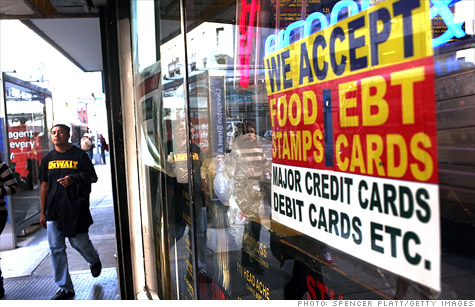
Millions of Americans stay above the poverty line thanks to government assistance.
NEW YORK (CNNMoney) -- Without help from the federal government, millions more people would have sunk below the poverty line in 2010, U.S. Census data shows.
Unemployment insurance helped keep 3.2 million Americans out of poverty in 2010, according to new statistics released Tuesday. Without this vital lifeline, which lasts up to 99 weeks, these jobless folks would have joined the roughly 46.2 million people now considered in poverty.
Other government assistance programs, such as food stamps, also provided much-needed support to the poor. But because the Census Bureau's official poverty statistics don't consider these income sources, they were not taken into account when determining whether a person fell below the line, which is $22,314 for a family of four.
However, the Census Bureau does calculate what impact this assistance would have had if it were measured. Food stamp benefits would have lifted 3.9 million people out of poverty had that aid been counted as income.
And 5.4 million people, including 3 million children, would not have been considered impoverished had the Earned Income Tax Credit been counted. The EITC is a refundable federal income tax credit for low- to moderate-income working Americans. Some 22 states also offer similar credits.
Federal health programs, including Medicaid and the Children's Health Insurance Program, also helped hundreds of thousands of youngsters stay insured even though their parents lost employer-based coverage. Some 570,000 fewer children were uninsured in 2010 than in 2007, before the recession began.
The number of people receiving help from the federal government is hovering near all-time highs as the Great Recession unleashed wave upon wave of layoffs. And with unemployment remaining stubbornly elevated, many Americans have had a hard time getting back on their feet again.
Roughly one in six Americans are on government aid, with the largest two programs being Medicaid and food stamps.
But federal and state budget crunches are swiftly chipping away at these safety nets. At least six states cut back on the number of weeks that the jobless can collect state unemployment insurance. Some states have reduced the generosity of their Earned Income Tax Credit, while Michigan recently limited the amount of time the poor can collect cash welfare benefits.
Even greater threats loom on the federal level.
The deadline to apply for federal extended unemployment benefits expires at the start of 2012. President Obama is pushing Congress to once again extend the deadline to apply for these benefits, which more than 3.1 million people collect. But House Majority Leader Eric Cantor said Tuesday he'd only favor an extension if it were tied to job opportunities.
And it remains to be seen what type of cuts the national debt super committee will recommend. It is charged with proposing up to $1.5 billion in reduced spending, and some advocates for the poor feel the ax will fall heavily on safety net programs. The federal government provides a wide array of assistance to low-income folks, ranging from health insurance to food stamps to housing help to child care.
"What those changes are will have a very large impact on poverty in both the years and decades ahead," said Robert Greenstein, president of the Center on Budget and Policy Priorities. ![]()
| Overnight Avg Rate | Latest | Change | Last Week |
|---|---|---|---|
| 30 yr fixed | 3.80% | 3.88% | |
| 15 yr fixed | 3.20% | 3.23% | |
| 5/1 ARM | 3.84% | 3.88% | |
| 30 yr refi | 3.82% | 3.93% | |
| 15 yr refi | 3.20% | 3.23% |
Today's featured rates:
| Latest Report | Next Update |
|---|---|
| Home prices | Aug 28 |
| Consumer confidence | Aug 28 |
| GDP | Aug 29 |
| Manufacturing (ISM) | Sept 4 |
| Jobs | Sept 7 |
| Inflation (CPI) | Sept 14 |
| Retail sales | Sept 14 |